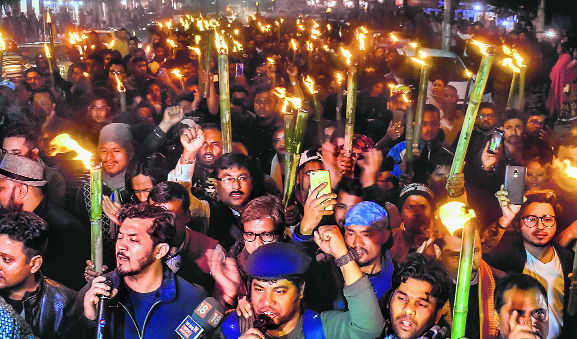
Damage control: SC status has been granted to six OBC communities of the state.
Seema Guha
Senior journalist
The BJP government’s decision to go ahead with the Amendment to the Citizenship Bill (2016), in the face of stiff opposition from the state, has backfired. The move has triggered massive protests. Anger is spilling over to the streets and spreading to the rest of the Northeast. It has punctured the BJP’s image and turned the once adoring Assamese middle class against PM Modi.
Last week, the Lok Sabha passed the amendment to the Citizenship Act to allow Hindus, Parsis, Sikhs, Jains, Buddhists and Christians from Bangladesh, Afghanistan and Pakistan eligible for Indian citizenship. The Bill makes the process easier by cutting down the residence provisions of applicants and virtually endorses 2014 as the cut-off date for Hindus from Bangladesh.
This goes against the Assam Accord where the date to determine nationality is March 24, 1971. Though the National Register of Citizens (NRC) is not a part of the accord, it also uses March 1971 as the base to determine who is a foreign national and who is a genuine citizen of Assam. It is believed that the majority of those whose names are not on the updated NRC list are Bengali Hindus. The Assamese fear that all of them will now be accommodated, making the entire exercise futile.
The accord that brought the movement against alleged foreign nationals to a close would now be breached, as Bengali Hindus from Bangladesh will automatically get citizenship. This will apply to Hindu migrants in other Northeastern states as well. This is why the region is up in arms. Assam is willing to accept those who came before 1971 as Indian nationals, but not the additional burden. This move to accommodate the Hindu Bengalis is seen as a betrayal by the BJP government.
That is quite something, considering that the BJP and PM Modi were a hot favourite of the Assamese. Since the beginning of the movement against foreign nationals in Assam (1979-1985), the BJP was regarded as the one national party that had always been with the local Assamese speakers and understood their fear of being reduced to a minority by the immigrant Bengali Muslims of Bangladesh.
The Congress, held responsible for encouraging illegal migration from Bangladesh for votes to remain in power, was the enemy. So, when Modi arrived at the scene in 2014, with the promise of throwing out all illegal foreign nationals, he was warmly embraced. This was a man who would not betray their cause as previous Congress leaders had done. Not only did they give the BJP seven parliamentary seats, but also elected a BJP government for the first time in the state. There was euphoria all round at a clean government in the state, with a dynamic PM overseeing developments at the Centre.
The BJP move has, therefore, come as a shock. What is more, the amendment is a violation of Article 14 of the Constitution, which guarantees right to equality and does not discriminate on the basis of religion. The BJP’s argument is that as these people are victims of the Partition, they have the right to claim ‘Hindu India’ as their home. The protection for Hindu minorities fits into the BJP’s Hindutva narrative.
As soon as the Bill was passed in the Lok Sabha, the Asom Gana Parishad, walked out of the coalition. The BJP euphoria about a ‘Congress mukt Northeast’ may soon fade, as its friends and allies in other Northeastern states are equally disturbed. They fear that Hindus and Buddhists from Bangladesh would flock to the region.
The BJP was well aware of the opposition to the move. Why did the normally astute BJP leadership score a self goal? Many believe it is a strategic decision, keeping in mind the 2019 elections, with an eye on neighbouring West Bengal, where the party is gaining momentum. The Northeast sends a total of 25 members to Parliament, 14 of them from Assam. West Bengal elects 42 members. The BJP has its eyes on the bigger state and is willing to take a gamble. The citizenship Bill will also help the BJP to consolidate its base in both the Barak valley dominated by Bengali Hindus as well as other areas in Assam where there are Bengali Hindus.
At the same time, the BJP is hoping to control damage in Assam. The Centre has announced SC status to six OBC communities of the state. They are the Chutiya, Morans, tea tribes, Tai Ahoms, Motoks and Koch-Rajbangshis. These will now become ST seats. The BJP hopes to break the stranglehold of the Bengali Muslims. Delimitation will ensure that 18 of the 126 seats in the Assam Assembly will be freed from Muslim control. Besides this, Home Minister Rajnath Singh announced a high-powered team to look into ways of preserving the culture and identity of the Assamese, as promised in Clause 6 of the Assam Accord. But that was a nonstarter, with AASU walking out and many others named doing the same.
For now, the BJP government in Assam is becoming extremely unpopular. Bringing in sedition charges against 80-year-old Hiren Gohain, a well-known Assamese intellectual, and two others, exposes the nervousness of the state government. The BJP is dividing Hindus against Muslims, Bengali speakers against the Assamese and the caste Assamese against the Scheduled Castes. Will polarisation work or come back to haunt the Modi-Shah duo?


























